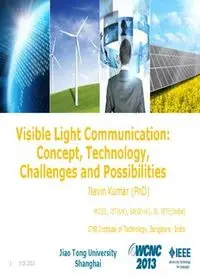
Visible Light Communication: Concept, Technology, Challenges and Possibilities PDF
Preview Visible Light Communication: Concept, Technology, Challenges and Possibilities
Visible Light Communication: Concept, Technology, Challenges and Possibilities Navin Kumar (PhD) MIEEE, IET(UK), IAEG(HK), IE, IETE(India) CMR Institute of Technology, Bangalore -India Jiao Tong University 1 3/25/2013 Shanghai Agenda Introduction Optical Wireless Infrared Free Space Optics Basic Components and Configuration Visible Light Communication Motivation LED Advancement 2 3/25/2013 Agenda … Characteristics Applications Technical Details Architecture and VLC System Modelling Development Prototype, Testing & Results Progress & Current Status Conclusion 3 3/25/2013 Introduction Visible Light Communication ? Communication using visible light Wirelessly. Tx 0 0 1 0 0 1 0 1 1 0 1 0 1 0 0 1 0 1 1 1 0 0 1 0 1 1 1 1 0 Rx 1 0 4 3/25/2013 Introduction: History Smoke signals of the ancient tribes The use of fire or lamp Beacon fire, lighthouse, ship-to-ship comm. Information delivery using mirror reflection (Heliograph): is a wireless solar telegraph that signals using Morse code flashes of sunlight reflected by a mirror. Traffic light : R/G/B color multiplexing (Walk/Stop) 5 3/25/2013 Traffic Signal Introduction: History … A le xander Grahm Bell’s Photophone (1880) Optical source: sunlight Modulation: vibrating mirror Receiver: parabolic mirror Distance: 700 ft (213m) In 1920, somewhat by accident, Losev foresaw the usage of optical links to relay information. In 1969, Gfeller presented Source: “Wireless In-House Data http://www.freespaceoptic.com/ Communication via Diffuse Infrared Radiation”. It became the stepping stone to VLC. 6 3/25/2013 Facts, Figures, and Trends of Wireless Networks and Technology Several Technologies move in the same direction 5G 4G Many Access Networks 7 3/25/2013 Introduction 8 3/25/2013 Introduction Wireless data transmission via optical carriers: opportunity, many yet unexplored. Optical Wireless Communication (OWC): Significant technical and operational advantages. OWC, in some applications: –a powerful alternative to radio frequency (RF) and, –complementary to existing RF wireless 9 3/25/2013 systems. Frequency Spectrum Licensing Area/ISM Special purposed Area Increasing Frequency(ν) 24 22 20 18 16 14 12 10 8 6 4 2 0 10 10 10 10 10 10 10 10 10 10 10 10 10 ν(Hz) High Frequency Micro Low Fγrerqauyesncy X rays UV IR FM AM Longwav(eSmall wavelength) (High wavelength) wave High Bandwidth Radiowave Large Coverage Security Mobility -16 -14 -12 -10 -8 -6 -4 -2 0 2 4 6 8 10 10 10 10 10 10 10 10 10 10 10 10 10 Increasing Wavelength(λ) λ(m) Visible Spectrum IrDA : 334THz(900nm) to Non-Licensing Area 353THz (850nm) 10 3/25/2013 380nm 780nm
